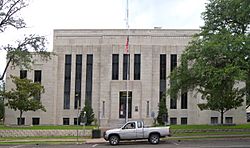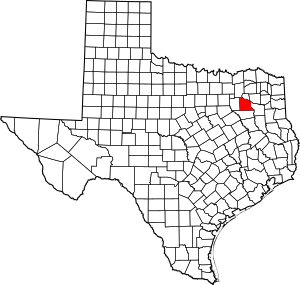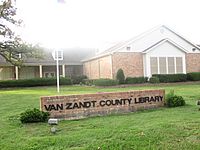Van Zandt County, Texas facts for kids
Quick facts for kids
Van Zandt County
|
|
|---|---|

The Van Zandt County Courthouse in Canton
|
|

Location within the U.S. state of Texas
|
|
 Texas's location within the U.S. |
|
| Country | |
| State | |
| Founded | 1848 |
| Named for | Isaac Van Zandt |
| Seat | Canton |
| Largest city | Canton |
| Area | |
| • Total | 860 sq mi (2,200 km2) |
| • Land | 843 sq mi (2,180 km2) |
| • Water | 17 sq mi (40 km2) 2.0% |
| Population
(2020)
|
|
| • Total | 59,541 |
| • Density | 69.2/sq mi (26.73/km2) |
| Time zone | UTC−6 (Central) |
| • Summer (DST) | UTC−5 (CDT) |
| Congressional district | 5th |
Van Zandt County is a county located in the U.S. state of Texas, in the northeastern part of the state. As of the 2020 census, its population was 59,541. Its county seat is Canton. The county is named for Isaac Van Zandt (1813–1847), a member of the Congress of the Republic of Texas.
Contents
History
Van Zandt County is commonly known as the Free State of Van Zandt. The title was particularly prevalent through the Reconstruction Era, but is still in use today. Many versions of the county's history may account for this moniker, and historians, even within the county and throughout its existence, do not agree how exactly it became known as the Free State.
One story of how the Free State of Van Zandt came to be originates with the county's formation. In 1848, Henderson County was split into three counties: Kaufman, Van Zandt, and what remained as Henderson County. Henderson County had been deeply in debt, yet the new Van Zandt County was founded without any obligations. Many believed that this was a mistake on the state's part, and bitter citizens and politicians from Henderson County referred to the new county as the Free State.
Van Zandt County tried on two distinct occasions to separate itself from Texas. The first was in 1861 when Texas seceded from the United States. About 350 citizens of Van Zandt County met to protest the secession. The practice of slavery was infrequent in the county. Slave owners, worried about losing their slaves in the Civil War, refused to bring their slaves to Van Zandt, because slavery was so uncommon there. The majority of Van Zandt wanted to stay with the Union, and reasoned that if Texas could secede from the United States, they could secede from Texas, and began organizing a government until they were threatened with military intervention. Although the secession was unsuccessful, the title of "Free State" stuck.
After Texas re-entered the Union after the Civil War, Van Zandt County again tried to secede from Texas, the Confederate States of America, and the United States. A convention was held in 1867 in which the citizens elected delegates, and the delegates voted for secession, and penned a Declaration of Independence modeled after the United States Declaration of Independence. The event was seen as a rebellion by the nation, and when word reached General Sheridan, he dispatched a cavalry unit to quell it. The citizens of Van Zandt called an emergency meeting that ended with the delegates declaring war on the United States. The wooded landscape at the time made moving difficult for horses, so the citizens of Van Zandt, familiar with the area, were able to ambush the unit, until they retreated. The citizens, elated with their victory, celebrated with an excess of alcohol. During their celebration, they were surrounded by Sheridan's troops, and were put in anklets and in a rough prison of wooden posts. Two ex-Confederate soldiers, W.A. Allen and Hardy Allen, were in the group, and W.A. Allen used a hidden knife to wear down the anklets. A combination of the beginning of the rainy season and a decreasing of the guard to one man allowed the prisoners to easily escape. After that, not much action on the part of Van Zandt or the United States was taken in the issue. Arrest warrants were sent, but none was carried out, and none of the prisoners went to trial.
Geography
According to the U.S. Census Bureau, the county has a total area of 860 sq mi (2,200 km2), of which 17 square miles (44 km2) (2.0%) are covered by water. Van Zandt County is unique in topography. The western and northwestern parts of the county are in the eastern edge of the Texas Blackland Prairies, the central part of the county is located in the post oak belt of Northeast Texas, and the eastern part of the county stretches into the East Texas Piney Woods. Two major rivers, the Neches and the Sabine, flow through Van Zandt County. Van Zandt County is referred to as the "Gateway to East Texas" due to its diverse topography.
Major highways
 Interstate 20
Interstate 20 U.S. Highway 80
U.S. Highway 80 State Highway 19
State Highway 19 State Highway 64
State Highway 64 State Highway 110
State Highway 110 State Highway 198
State Highway 198
Adjacent counties
- Rains County (north)
- Wood County (northeast)
- Smith County (east)
- Henderson County (south)
- Kaufman County (west)
- Hunt County (northwest)
Communities
Cities
- Canton (county seat)
- Edgewood
- Edom
- Fruitvale
- Grand Saline
- Van
- Wills Point
Census-designated places
- Ben Wheeler
- Callender Lake
- Myrtle Springs
Other unincorporated communities
- Alsa
- Colfax
- Martin's Mill
- Midway
- Oakland
- Phalba
- Primrose
- Silver Lake
- Tundra
- Walton
- Wentworth
- Wise
Ghost towns
Demographics
| Historical population | |||
|---|---|---|---|
| Census | Pop. | %± | |
| 1850 | 1,348 | — | |
| 1860 | 3,777 | 180.2% | |
| 1870 | 6,494 | 71.9% | |
| 1880 | 12,619 | 94.3% | |
| 1890 | 16,225 | 28.6% | |
| 1900 | 25,481 | 57.0% | |
| 1910 | 25,651 | 0.7% | |
| 1920 | 30,784 | 20.0% | |
| 1930 | 32,315 | 5.0% | |
| 1940 | 31,155 | −3.6% | |
| 1950 | 22,593 | −27.5% | |
| 1960 | 19,091 | −15.5% | |
| 1970 | 22,155 | 16.0% | |
| 1980 | 31,426 | 41.8% | |
| 1990 | 37,944 | 20.7% | |
| 2000 | 48,140 | 26.9% | |
| 2010 | 52,579 | 9.2% | |
| 2020 | 59,541 | 13.2% | |
| U.S. Decennial Census 1850–2010 2010 2020 |
|||
| Race / Ethnicity (NH = Non-Hispanic) | Pop 2000 | Pop 2010 | Pop 2020 | % 2000 | % 2010 | % 2020 |
|---|---|---|---|---|---|---|
| White alone (NH) | 42,619 | 45,087 | 47,986 | 88.53% | 85.75% | 80.59% |
| Black or African American alone (NH) | 1,390 | 1,403 | 1,517 | 2.89% | 2.67% | 2.55% |
| Native American or Alaska Native alone (NH) | 231 | 371 | 328 | 0.48% | 0.71% | 0.55% |
| Asian alone (NH) | 84 | 168 | 272 | 0.17% | 0.32% | 0.46% |
| Pacific Islander alone (NH) | 10 | 32 | 30 | 0.02% | 0.06% | 0.05% |
| Other race alone (NH) | 5 | 15 | 133 | 0.01% | 0.03% | 0.22% |
| Mixed race or Multiracial (NH) | 600 | 656 | 2,204 | 1.25% | 1.25% | 3.70% |
| Hispanic or Latino (any race) | 3,201 | 4,847 | 7,071 | 6.65% | 9.22% | 11.88% |
| Total | 48,140 | 52,579 | 59,541 | 100.00% | 100.00% | 100.00% |
As of the census of 2000, 48,140 people, 18,195 households, and 13,664 families resided in the county. The population density was 57 people per square mile (22 people/km2). The 20,896 housing units averaged 25 units per square mile (9.7 units/km2). The racial makeup of the county was 91.96% White, 2.94% African American, 0.62% Native American, 0.18% Asian, 2.74% from other races, and 1.56% from two or more races. About 6.65% of the population was Hispanic or Latino of any race.
Of the 18,195 households, 31.80% had children under the age of 18 living with them, 62.60% were married couples living together, 8.70% had a female householder with no husband present, and 24.90% were not families. Around 22.00% of all households were made up of individuals, and 11.60% had someone living alone who was 65 years of age or older. The average household size was 2.59 and the average family size was 3.01.
In the county, the population was distributed as 25.50% under the age of 18, 7.30% from 18 to 24, 25.20% from 25 to 44, 24.90% from 45 to 64, and 17.00% who were 65 years of age or older. The median age was 40 years. For every 100 females, there were 97.00 males. For every 100 females age 18 and over, there were 93.70 males.
The median income for a household in the county was $35,029, and for a family was $41,175. Males had a median income of $31,887 versus $21,344 for females. The per capita income for the county was $16,930. About 10.30% of families and 13.30% of the population were below the poverty line, including 15.90% of those under age 18 and 12.10% of those age 65 or over.
Education
These school districts serve Van Zandt County:
- Canton ISD
- Edgewood ISD
- Fruitvale ISD
- Grand Saline ISD
- Martin's Mill ISD
- Van ISD
- Wills Point ISD
Media
The only radio station licensed to Van Zandt County is KWJB broadcasting on 1510 AM and 95.1 FM. Van Zandt County receives outlying signals on the outer signal edges of Dallas/Fort Worth DMA. Local media outlets are: KDFW-TV, KXAS-TV, WFAA-TV, KTVT-TV, KERA-TV, KTXA-TV, KDFI-TV, KDAF-TV, and KFWD-TV. Other nearby stations that provide coverage for Van Zandt County come from the Tyler/Longview/Jacksonville market and they include: KLTV, KYTX-TV, KFXK-TV, KCEB-TV, and KETK-TV.
Newspapers and publications
- Canton Herald
- Wills Point Chronicle
- Canton Guide
- Van Zandt County News
- East Texas Homes and Farms
Transportation
Airports
- Van Zandt County Regional Airport (Wills Point)
- Canton-Hackney Airport (Canton)
See also
 In Spanish: Condado de Van Zandt para niños
In Spanish: Condado de Van Zandt para niños


